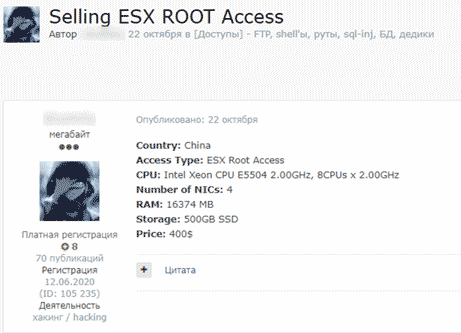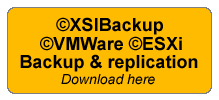|
Last updated on Tuesday 30th of May 2023 10:36:45 AM Massive ransomware attack affecting ©VMWare ©ESXi serversHow to protect your infrastructure, act before it's too lateThe attackA massive attack affecting ©VMWare ©ESXi servers servers has taken place and is still going on. Many clients have contacted us asking for advice and a way to protect their data.The attack vector was confirmed to exploit an OpenSLP vulnerability that could have to do with CVE-2021-21974, this has still not been confirmed. Some older versions of ©VMWare ©ESXi have a heap overflow vulnerability affecting their OpenSLP services and this has most probably been the way the attackers have been able to sneak their malicious code in. This issue affects servers running ©VMWare ©ESXi 6.X and early versions of the 7.0 branch. ©ESXi-7.0U3f-20036589 is known to be safe. 
Any server behind a firewall with basic filtering is safe from this threat. The most vulnerable servers are cheap dedicated servers lacking any perimetral security. ©ESXi includes a toy FW with very little configuration possibilities. This makes that in the vast majority of the cases people use this servers as they are, with all services activated and open to the world, ready to receive attacks from anybody with the will to perform them. How do you know if you have been affected by the ransomware?. It is rather obvious, as the attackers disable the SSH and Web GUI and place a text asking for the ransom. Affected servicesAs said the affected service in this ocassion is OpenSLP.
Service Location Protocol (SLP) is an Internet Engineering Task Force (IETF) standards track protocol that provides a framework to allow networking applications to discover the existence, location, and configuration of networked services in enterprise networks.
As you are probably wondering: do I need this? Well, most probably not. In fact most probably you don't need many other services listening in the ©ESXi management interface. So the thing is that you can be affected by some malware that encrypts all your data just because you are attacked through a service that you aren't even using. Sounds a bit dumb, doesn't it?. This is a veiled critic to ©VMWare developers, who hinder the use of OpenSSH, an industry standard with no known serious bugs since more than 10 years ago, but leave dozens of open services which most people won't be using, even when they know they contain some well known vulnerabilities. Take actionAs you have already imagined, the wisest thing to do as a first measure is to open only those services that you'll be using. This is a list of the services in ©ESXi and their default state (as of ©ESXi 6.7.0):
Not all the above services open IP ports, some do though. Some others are local services, but they still use memory. Per instance, if you will not be using iSCSI you may turn all related services off. There are a number of services in the above list that we can just turn off to reduce memory consumption and to reduce the attack surface. For the case being, namely: the OpenSLPD service, the below code snippet will suffice
/etc/init.d/slpd stop;chkconfig slpd off
What it does is to turn the SLPD daemon off and disable the service so that it is not started again in case you reboot the server. |


|
Login • Available in: 


